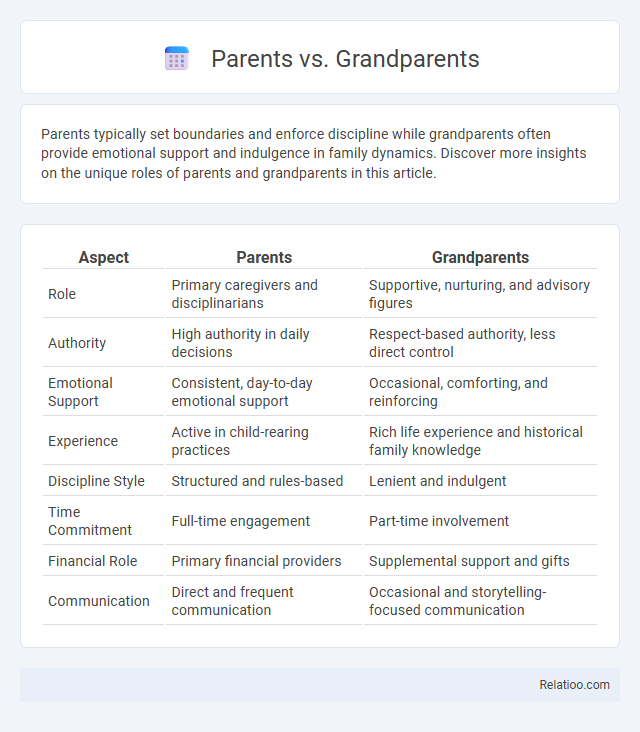Parents typically set boundaries and enforce discipline while grandparents often provide emotional support and indulgence in family dynamics. Discover more insights on the unique roles of parents and grandparents in this article.
Table of Comparison
| Aspect | Parents | Grandparents |
|---|---|---|
| Role | Primary caregivers and disciplinarians | Supportive, nurturing, and advisory figures |
| Authority | High authority in daily decisions | Respect-based authority, less direct control |
| Emotional Support | Consistent, day-to-day emotional support | Occasional, comforting, and reinforcing |
| Experience | Active in child-rearing practices | Rich life experience and historical family knowledge |
| Discipline Style | Structured and rules-based | Lenient and indulgent |
| Time Commitment | Full-time engagement | Part-time involvement |
| Financial Role | Primary financial providers | Supplemental support and gifts |
| Communication | Direct and frequent communication | Occasional and storytelling-focused communication |
Introduction: Understanding the Generational Divide
Parents and grandparents often offer different types of emotional support due to their distinct generational perspectives and life experiences. You may find that parents provide more immediate guidance and boundary-setting, while grandparents contribute with nurturing kindness and long-term wisdom. Recognizing these complementary roles enhances family dynamics and strengthens the overall emotional support system.
Parenting Styles: Then vs. Now
Parenting styles have evolved significantly from the more authoritative approaches typically favored by grandparents to the balanced, empathetic methods embraced by many modern parents, emphasizing emotional support. Grandparents often relied on discipline and tradition to guide children, while contemporary parents prioritize open communication and emotional intelligence to foster resilience and self-esteem. This shift reflects broader societal changes valuing mental health and emotional well-being in child development.
Discipline Approaches: Contrasts and Conflicts
Discipline approaches often differ between parents and grandparents, creating emotional support challenges within family dynamics. Parents typically emphasize consistent rules and long-term behavioral goals, while grandparents may prioritize warmth and forgiveness, resulting in conflicts over boundaries. Understanding these contrasts helps you navigate emotional support needs while maintaining healthy discipline strategies.
Role in Child’s Upbringing: Primary vs. Supportive
Parents serve as the primary caregivers in a child's upbringing, establishing foundational emotional support, discipline, and guidance critical for development. Grandparents often play a supportive role by providing additional emotional warmth, wisdom, and stability that reinforce the primary caregiving environment. This complementary dynamic strengthens the child's sense of security and identity through multigenerational involvement.
Technology and Modern Parenting Differences
Parents today integrate advanced technology like smartphones and educational apps to balance work and childcare, contrasting with grandparents who often rely on traditional, experience-based emotional support methods. Your emotional support system can benefit from the grandparents' wisdom paired with parents' tech-savvy strategies, creating a comprehensive approach to modern parenting challenges. Understanding these differences highlights how technology reshapes family dynamics and emotional connections across generations.
Health, Nutrition, and Safety Perspectives
Parents typically prioritize immediate health, nutrition, and safety needs by ensuring balanced meals, routine medical checkups, and secure environments for their children. Grandparents often provide emotional support through nurturing bonding and sharing wisdom, while also cautiously addressing nutrition by offering traditional, comforting foods that may complement parental guidelines. Your family's well-being benefits from this combined approach, balancing vigilant care with emotional reassurance to foster holistic development.
Cultural Values and Traditions Passed Down
Parents and grandparents play distinct yet complementary roles in passing down cultural values and traditions, with parents often instilling daily practices and immediate family customs while grandparents provide historical context and continuity of ancestral heritage. Emotional support from grandparents reinforces cultural identity through storytelling, rituals, and shared experiences that strengthen family bonds across generations. This intergenerational exchange enriches children's understanding of their roots, fostering resilience and a strong sense of belonging within their cultural community.
Balancing Influence in a Child’s Life
Balancing the emotional support from parents and grandparents is crucial for Your child's well-being, as each plays a unique role in providing stability and love. Parents typically offer consistent guidance and discipline, while grandparents contribute wisdom, comfort, and a nurturing presence that enriches emotional development. Maintaining open communication ensures a harmonious relationship that fosters Your child's sense of security and emotional resilience.
Communication and Conflict Resolution
Parents and grandparents often differ in communication styles, with parents typically emphasizing direct problem-solving while grandparents provide emotional reassurance through storytelling and shared experiences. Effective conflict resolution benefits from blending these approaches, where clear dialogue from parents meets empathetic listening from grandparents, fostering a supportive environment for children. Prioritizing open communication channels between generations enhances emotional support, reducing misunderstandings and strengthening family bonds.
Building Harmony Between Parents and Grandparents
Effective communication and mutual respect are essential for building harmony between parents and grandparents, creating a supportive environment for children. Recognizing the unique emotional support that both generations provide helps balance differing perspectives and parenting styles. Encouraging collaboration and shared decision-making fosters a united family front, enhancing the child's emotional well-being.

Infographic: Parents vs Grandparents
 relatioo.com
relatioo.com